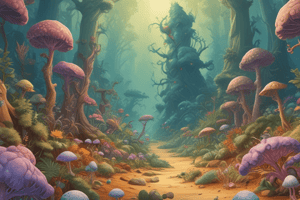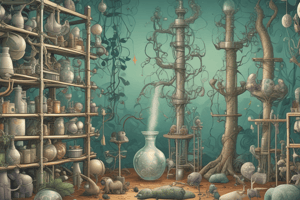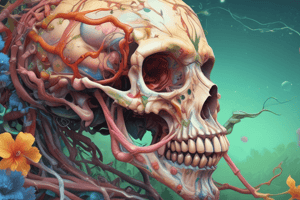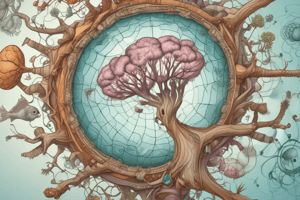Podcast
Questions and Answers
What is the study of the interactions between organisms and their environment?
What is the study of the interactions between organisms and their environment?
- Microbiology
- Ecology (correct)
- Zoology
- Botany
What are the basic structural and functional units of life?
What are the basic structural and functional units of life?
- Organs
- Organisms
- Tissues
- Cells (correct)
What is the study of heredity, genes, and genetic variation?
What is the study of heredity, genes, and genetic variation?
- Genetics (correct)
- Ecology
- Biochemistry
- Molecular Biology
What provides energy and structure for cells?
What provides energy and structure for cells?
What are groups of similar cells that perform a specific function?
What are groups of similar cells that perform a specific function?
What is the ability of an organism to maintain a stable internal environment despite changes in the external environment?
What is the ability of an organism to maintain a stable internal environment despite changes in the external environment?
What is the study of the structure, function, and interactions of biological molecules, such as DNA, proteins, and carbohydrates?
What is the study of the structure, function, and interactions of biological molecules, such as DNA, proteins, and carbohydrates?
What are structures composed of two or more types of tissues that work together to perform a specific function?
What are structures composed of two or more types of tissues that work together to perform a specific function?
Flashcards are hidden until you start studying
Study Notes
What is Biology?
- Biology is the scientific study of life and living organisms, including their structure, function, growth, evolution, distribution, and taxonomy.
- It explores the diversity of life on Earth, from the simplest bacteria to complex ecosystems.
Branches of Biology
- Botany: study of plants, including their structure, growth, evolution, classification, and interactions with the environment.
- Zoology: study of animals, including their structure, behavior, evolution, classification, and interactions with the environment.
- Microbiology: study of microorganisms, such as bacteria, viruses, and fungi.
- Ecology: study of the interactions between organisms and their environment.
- Genetics: study of heredity, genes, and genetic variation.
- Biochemistry: study of the chemical processes that occur within living organisms.
- Molecular Biology: study of the structure, function, and interactions of biological molecules, such as DNA, proteins, and carbohydrates.
Basic Concepts
- Cells: the basic structural and functional units of life.
- Organisms: individual living entities, such as animals, plants, and microorganisms.
- Tissues: groups of similar cells that perform a specific function.
- Organs: structures composed of two or more types of tissues that work together to perform a specific function.
- Organ Systems: groups of organs that work together to perform a specific function.
- Homeostasis: the ability of an organism to maintain a stable internal environment despite changes in the external environment.
Biological Molecules
- Carbohydrates: provide energy and structure for cells.
- Proteins: perform a wide range of functions, including catalyzing metabolic reactions, replicating DNA, and responding to stimuli.
- Lipids: provide energy, structure, and insulation for cells.
- Nucleic Acids: contain the genetic information necessary for the development and function of an organism.
Biological Processes
- Photosynthesis: the process by which plants and some other organisms convert light energy into chemical energy.
- Respiration: the process by which cells generate energy from the food they consume.
- Cell Division: the process by which cells reproduce themselves.
- Gene Expression: the process by which the information encoded in DNA is converted into a functional product, such as a protein.
Evolution
- Natural Selection: the process by which populations of organisms adapt and evolve over time in response to environmental pressures.
- Speciation: the process by which a new species emerges from an existing one.
- Phylogeny: the study of the evolutionary history of organisms.
What is Biology?
- Biology is the scientific study of life and living organisms, covering structure, function, growth, evolution, distribution, and taxonomy.
- It explores the diversity of life on Earth, from simplest bacteria to complex ecosystems.
Branches of Biology
- Botany: studies plants, including structure, growth, evolution, classification, and environmental interactions.
- Zoology: studies animals, including structure, behavior, evolution, classification, and environmental interactions.
- Microbiology: studies microorganisms like bacteria, viruses, and fungi.
- Ecology: studies interactions between organisms and their environment.
- Genetics: studies heredity, genes, and genetic variation.
- Biochemistry: studies chemical processes within living organisms.
- Molecular Biology: studies structure, function, and interactions of biological molecules like DNA, proteins, and carbohydrates.
Basic Concepts
- Cells: basic structural and functional units of life.
- Organisms: individual living entities like animals, plants, and microorganisms.
- Tissues: groups of similar cells performing a specific function.
- Organs: structures composed of two or more types of tissues performing a specific function.
- Organ Systems: groups of organs working together to perform a specific function.
- Homeostasis: an organism's ability to maintain a stable internal environment despite external changes.
Biological Molecules
- Carbohydrates: provide energy and structure for cells.
- Proteins: perform various functions, including catalyzing metabolic reactions, replicating DNA, and responding to stimuli.
- Lipids: provide energy, structure, and insulation for cells.
- Nucleic Acids: contain genetic information necessary for an organism's development and function.
Biological Processes
- Photosynthesis: converts light energy into chemical energy in plants and some organisms.
- Respiration: generates energy from consumed food in cells.
- Cell Division: process by which cells reproduce themselves.
- Gene Expression: converts DNA information into a functional product like a protein.
Evolution
- Natural Selection: process by which populations adapt and evolve over time due to environmental pressures.
- Speciation: process by which a new species emerges from an existing one.
- Phylogeny: studies the evolutionary history of organisms.
Studying That Suits You
Use AI to generate personalized quizzes and flashcards to suit your learning preferences.




